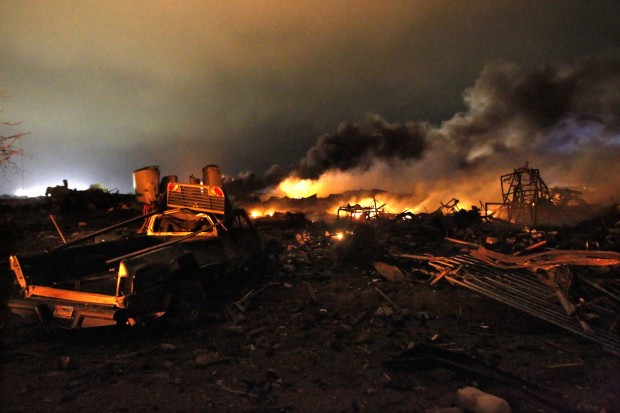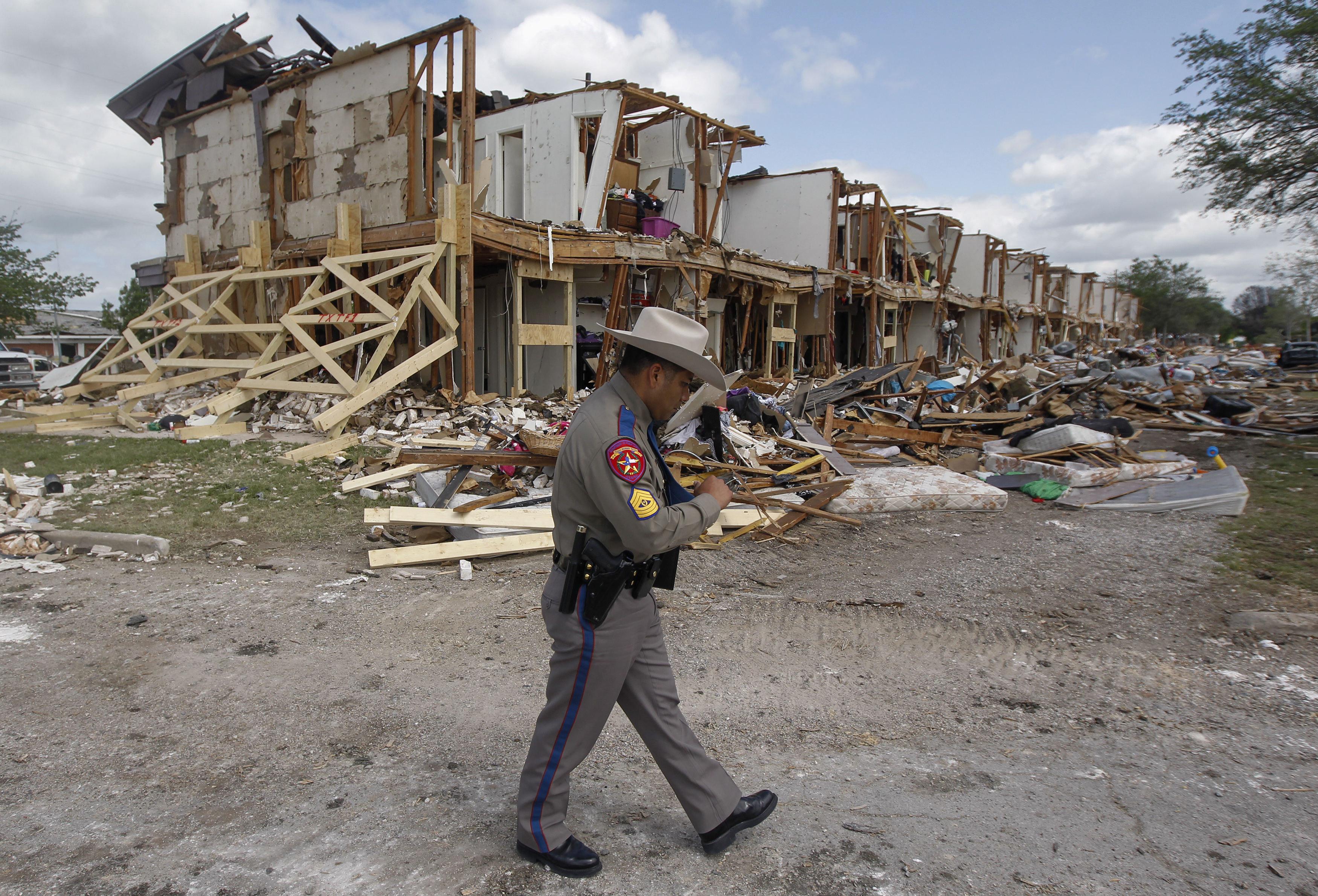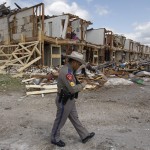Proposals to Prevent Another Fertilizer Explosion Immediately Meet Resistance

Photo by REUTERS /MIKE STONE /LANDOV
A vehicle is seen near the remains of a fertilizer plant burning after the explosion.
The explosion at a fertilizer plant in the small town of West, Texas last year took much more than fifteen lives. At least 262 people were injured; twenty percent of those were brain injuries. Homes and schools were destroyed. But judging from the response of some state lawmakers charged with stopping it from happening again, preventable disasters like the one in West are just something Texans are going to have to live with from time to time.
There’s been no new regulations for fertilizer plants since the disaster until this month, but there’s been a consensus for some time about how to prevent another tragedy like the one in West: require fertilizer plants to store ammonium nitrate in non-combustible facilities or to use sprinklers; conduct inspections of facilities; and train first responders so they know how to deal with fires that may break out at sites with ammonium nitrate.
A draft bill to do just that was introduced Tuesday by state Rep. Joe Pickett (D-El Paso), chair of the House Homeland Security and Public Safety Committee. But Republicans on his committee like Rep. Dan Flynn (R-Van) made clear at a hearing yesterday that they’re likely going to fight new regulations proposed to prevent another West. Flynn said new rules could put “Mom and Pop” fertilizer companies out of business, and he worries that any new rules for volunteer fire departments could strain budgets.
To get an idea of how much resistance the proposed rules could face from Republicans, take a look at one of the exchanges between Flynn and Pickett. Pickett proposed training volunteer fire departments to deal with fires at ammonium nitrate facilities. Currently, they get two days of training free, but another two days of hands-on training that is needed isn’t covered by the state. Over 70 percent of the firefighters in Texas are voluntary, and don’t have the authority to inspect facilities with ammonium nitrate. Pickett wants to change that, but Flynn and other rural Republicans weren’t convinced.
“When you start requiring basic gear that a municipality has to a local Volunteer Fire Department, you’re going to put them out of business,” Flynn said. “In a rural area, I’d rather have some people that are willing to come out and … ”
“Spit on it?” Pickett interrupted.
“Well, if that’s what what they have to do,” Flynn replied. “I don’t want to be that naïve.”
“But there’s nothing in here that says they have to buy a new fire truck!” Pickett said. “We’re talking about training.”
It went on like this for some time. Pickett proposing something, with Republican lawmakers from rural areas pushing back. Pickett noted that there haven’t really been any changes at facilities storing ammonium nitrate in combustible buildings or without sprinkler systems. He said they were waiting on the legislature to see what they need to do. “Very few have done anything on their own to make it safe for their employees” and surrounding communities, Pickett said.

Photo by Jorge Sanhueza-Lyon/KUT
A helmet is carried in remembrance of a firefighter from the Abbott Volunteer Fire Department killed in the fertilizer plant explosion in West, Texas last year.
The rules proposed by Pickett amount to a “horrendous amount of regulation put on small businesses,” Flynn said. It struck him as a “power grab.”
“If we do nothing, we’ll have another West,” Pickett responded.
State Rep. George Lavender (R-Texarkana) agreed with his fellow Republican Flynn, saying the bill was “overkill.”
“I recognize the tragedy that we had and we certainly need to avoid that in the future, but there’s a lot of stuff in here that’s really bad,” Lavender said. Lavender did later say that he’s not opposed to storing ammonium nitrate in non-combustible containers and making facilities subject to inspection by properly-trained firefighters.
But Republicans and Democrats weren’t the only voices in the room. Representatives of the agricultural industry testified that they generally support the rules, but would like to see some modifications. For instance, Pickett’s bill uses national fire codes to regulate storage of ammonium nitrate; the agricultural industry representatives indicated they’d prefer a Texas set of rules independent of the federal ones, which can be complex and a “moving target.”
Over a year after the disaster, at least one new rule is on the way. Tim Herrman, the State Chemist, testified that new requirements from his department are on the way that could also have an impact. Facilities with ammonium nitrate should keep the chemical in a separate structure, and that structure “should be a minimum 30 feet from any other structure containing combustible or flammable materials,” Herrman said. But ammonium nitrate can still be stored in wooden buildings, and the rule doesn’t cover how structures should be ventilated.*
If a bill with new regulations for facilities with ammonium nitrate does pass next year and is signed into law by whoever is governor, it would still be years before existing ammonium nitrate facilities are required to comply. What’s clear from the hearing this week is that any new regulations will face an uphill battle in the Republican-controlled, anti-regulation state legislature.
Pickett says he understands that, and is willing to put together a bill that can get passed. He also says he’s willing to pressure Republicans to prioritize safety.
“I want to embarrass some of my colleagues, make them realize that this is a real issue,” Pickett told reporters after the hearing. He said if he really wanted to be “onerous,” he would’ve proposed a statewide fire code. Instead, his bill focuses solely on facilities with ammonium nitrate. Pickett said his bill, with some tweaks, will be ready to file the first day bills can be filed in November.
Read the proposed legislation below:


